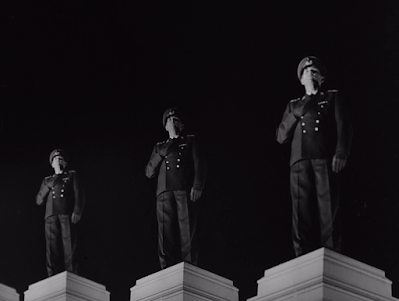Alemán | Subs: Castellano/English/Portugués/Français/Italiano (muxed)
18 min | x-264 764x576 | 3000 kb/s | 96 kb/s AC3 | 23.97 fps
404 MB
404 MB
La adaptación de Straub-Huillet de la mordaz sátira Diario de Bonn
de Heinrich Böll presenta las reflexiones de un oficial reactivado que
es convocado a la capital de Alemania Occidental por el Ministerio de
Defensa para establecer una Academia de Memorias Militares. Straub
consideraba su película como una intervención contra el rearme alemán en
la época de Adenauer: "Machorka-Muff es la historia de una violación,
la violación de un país al que se le ha impuesto un ejército, un país
que habría sido más feliz sin uno."
En "Machorka-Muff", el Sr. Straub, empleando el enfoque frío, algo expresionista pero siempre locuaz de sus otras películas, se acerca más a subrayar la ironía casi subliminal de sus temas. Describe brevemente, a través de la actuación del Coronel Machorka-Muff, un ex nazi reintegrado en el régimen de Adenauer, el pensamiento inmutable de la mente nazi y/o militar. Como el coronel del título, el Dr. Johannes Eckhardt es propiamente frío y convincente como creyente en los derechos del soldado. Aunque es la más corta y temprana de las películas de Straub, es a la vez una de sus obras más lúcidas y claramente indicativa de su potencial como cineasta imaginativo.
En "Machorka-Muff", el Sr. Straub, empleando el enfoque frío, algo expresionista pero siempre locuaz de sus otras películas, se acerca más a subrayar la ironía casi subliminal de sus temas. Describe brevemente, a través de la actuación del Coronel Machorka-Muff, un ex nazi reintegrado en el régimen de Adenauer, el pensamiento inmutable de la mente nazi y/o militar. Como el coronel del título, el Dr. Johannes Eckhardt es propiamente frío y convincente como creyente en los derechos del soldado. Aunque es la más corta y temprana de las películas de Straub, es a la vez una de sus obras más lúcidas y claramente indicativa de su potencial como cineasta imaginativo.
Straub-Huillet’s adaptation of Heinrich Böll’s biting satire Bonn Diary
presents the reflections of a reactivated officer who is summoned to the
West German capital by the Ministry of Defense to establish an Academy
for Military Memories. Straub considered his film to be an intervention
against German rearmament in the Adenauer era: "Machorka-Muff is the
story of a rape, the rape of a country on which an army has been
imposed, a country which would have been happier without one."
In "Machorka-Muff," Mr. Straub, employing the cold, somewhat expressionistic but always loquacious approach of his other films, comes closest to underlining the almost subliminal irony of his themes. He briefly outlines, through the performance of Colonel Machorka-Muff, a former Nazi who is reinstated in the Adenauer regime, the unchanging thinking of the Nazi and/or the military mind. As the colonel of the title, Dr. Johannes Eckhardt is properly cold and convincing as the believer in the rights of the soldier. Although it is the shortest and earliest of Mr. Straub's films, it is both one of the most lucid of his works and clearly indicative of his potential as an imaginative filmmaker.
In "Machorka-Muff," Mr. Straub, employing the cold, somewhat expressionistic but always loquacious approach of his other films, comes closest to underlining the almost subliminal irony of his themes. He briefly outlines, through the performance of Colonel Machorka-Muff, a former Nazi who is reinstated in the Adenauer regime, the unchanging thinking of the Nazi and/or the military mind. As the colonel of the title, Dr. Johannes Eckhardt is properly cold and convincing as the believer in the rights of the soldier. Although it is the shortest and earliest of Mr. Straub's films, it is both one of the most lucid of his works and clearly indicative of his potential as an imaginative filmmaker.
DVD rip y capturas de nosaterra






No hay comentarios.:
Publicar un comentario